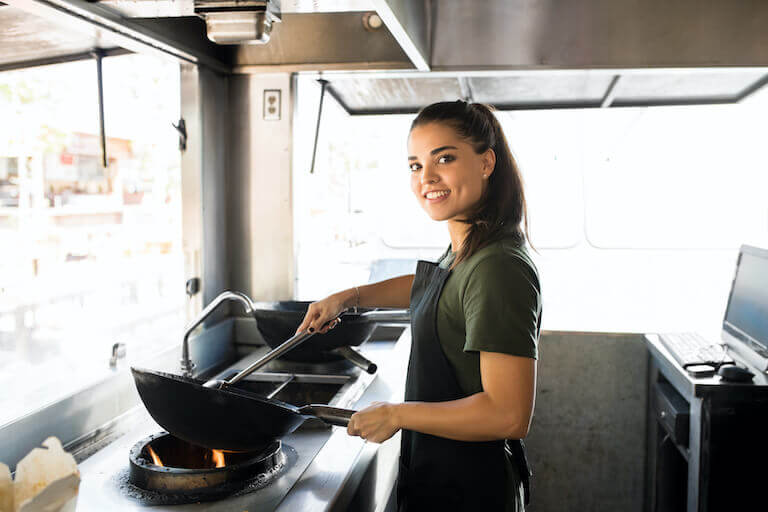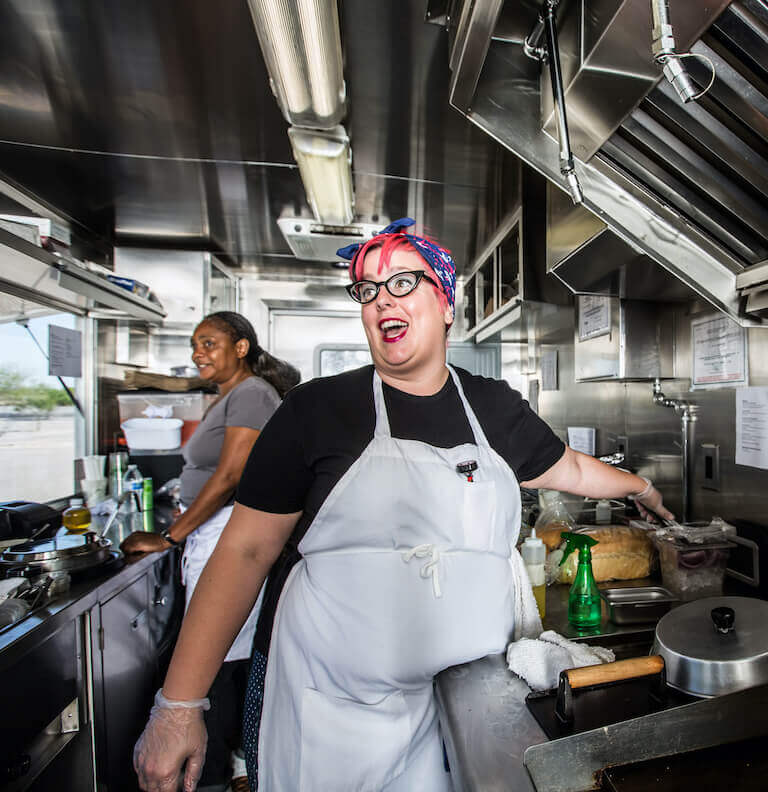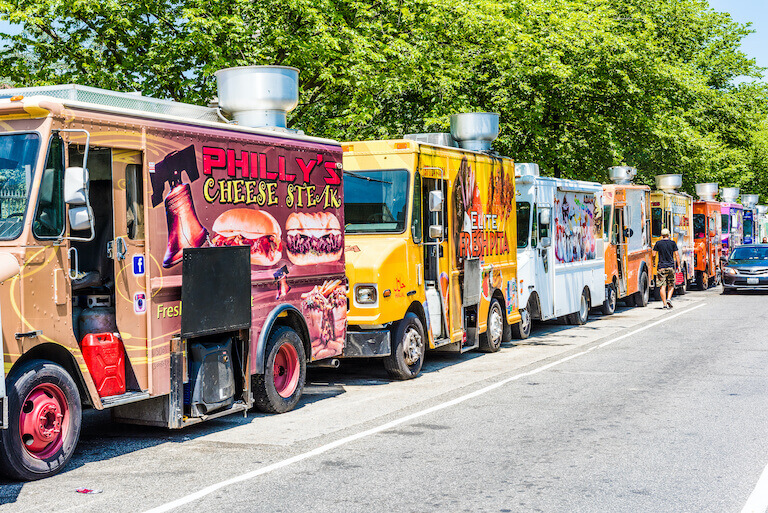From a regulatory standpoint, a food truck is a complex operation! It’s a foodservice business, but it doesn’t have the space or the sanitation facilities of a restaurant kitchen. It can operate in multiple cities, counties, and even states. Plus, the whole thing is on wheels, which means it must be safe to take on the road.
Put all that together, and it’s no wonder that so many licenses are necessary to start a food truck!
We’re going to explore some of these licenses and permits here. But with so much variation on specific rules from city to city, this list is not comprehensive. So make sure to check with your local authorities for a full explanation of all licenses needed to start a food truck!
The Business Permits and Licenses You May Need to Start a Food Truck
First thing’s first! A food truck is a business, so it has to comply with certain business requirements. These will vary based on your city, county, and state, but you can get started with this guide.
Business Formation and Registration with Secretary of State
Before you can do anything else with permitting and licensing, you have to create your business. This means deciding on the type of business entity you want, and then filing the paperwork to get it registered.
Common business entity types for food trucks include sole proprietorships, limited liability companies, and corporations. A lawyer will be able to advise you on the best entity type for your business.
Once you’ve chosen your entity type, you’ll have to file some paperwork with your state’s Secretary of State. The forms and cost will vary among states and entity types. Expect to pay anywhere from $50 to $1,000* for the various filing fees.
Common Business Entities for Food Trucks*
- Sole Proprietorship: The simplest form of business. A sole proprietorship has a single owner, but there is no legal separation between personal assets/liabilities and business assets/liabilities, which can lead to financial and legal risk.
- Limited Liability Company (LLC): An LLC is slightly more complex than an LLC. It may be owned by a single person, a group of people, or by another corporation. The benefit is that LLCs create a clear separation between the assets and liabilities of the owners and the business.
- Corporation: The most complex business structure. A corporation is owned by shareholders, who may come from within or from without the business. Like an LLC, a corporation limits the personal liability of the owners/shareholders.
**Auguste Escoffier School of Culinary Arts does not provide legal advice. Always consult with an attorney before creating a new business entity!
Employer ID Number
After you’ve created your organization, you can request an Employer ID Number (EIN) from the IRS. This is the number you’ll need for all federal tax filings. Fortunately, requesting an EIN is quick and free! You can request one online at IRS.gov.
Seller’s Permit or Sales & Use Tax Permit
To stay on the right side of your state taxes, you may need to register for a Seller’s Permit or a Sales & Use Tax Permit with your state controller. Once you have your permit, you may be responsible for monthly or quarterly sales tax filings based on how much revenue your truck makes. Don’t miss your due dates, or you could have to pay hefty fines!
Depending on the state, your Seller’s Permit could cost up to $100.

Food trucks must keep on top of their state and federal tax obligations.
Business License
Some states require a general business license for all businesses in order to operate. If you’re planning to open your food truck in Alabama, Alaska, Delaware, Hawaii, Maine, Maryland, Nevada, Tennessee, or Washington, you can expect to need a business license. The fees for these licenses can range from $20 to $500, depending on the location.
Other states require that businesses get licensed with their specific regulatory agencies. So instead of acquiring a general business license, you may need a more specific license like a Food Truck Permit. Check the rules in your area carefully!
Certificate of Liability Insurance
Before you can start operating, you’ll need proof of liability insurance. This may protect your business financially in the event of certain repairs and legal fees.
Most states require a minimum amount of coverage, often $1 million. The cost of your coverage will vary, but one insurer estimates an average of $45 per month ($560 per year) as the median cost.

Liability insurance may protect your business in the event of legal trouble or vandalism.
Hawker’s Permit/Vendor’s License
Some cities and municipalities require a hawker’s or vendor’s license for the individuals working on your food truck. In Boston, for example, anyone working the truck who will handle money must have a permit, and at least one valid permit must be presented before the truck can be issued its Food Truck Permit.
Expect to spend less than $100 per person per year on hawker’s or vendor’s permits.
Food Truck Permit
After you have your business entity created and your truck set up and ready to operate, you’ll have to file for a Food Truck Permit or your city’s equivalent.
These permits may operate under different names. In Austin, this is called a Mobile Food Vendor permit, and in Pittsburgh, it’s called a Mobile Vehicle Vendor License.
For specific rules regarding how to get a food truck permit, check with your local authority. In general, this permit will require an application, as well as many of the other items included on this list. For example, you may need to have your business entity established, a sales tax permit in place, fire inspections passed, and a commissary kitchen letter of agreement before you can submit your application.
The process will probably require an onsite inspection, which will verify that your truck meets local code. You should become familiar with your local permitting rules before you buy or remodel your food truck to make sure that it’s built to code!

Once you have your food truck permit (and any other necessary licenses), you can open up shop!
Health and Safety Permits for Food Truck Operations
Just like a restaurant, a food truck has an obligation to ensure a safe work environment for its employees, and safe food for its guests. These licenses and permits verify these safety requirements.
Fire Safety Inspection and/or Permit
Any cooking location must comply with certain fire safety standards. This may include a fire sprinkler system installed over your cooktop, or it may have specific fire extinguisher requirements. Both sprinklers and extinguishers need periodic checks and recharges to keep them operational. These permits and inspections usually need to be renewed annually.
A Fire Safety Inspection may be required before the truck receives a Certificate of Occupancy, which may be required before you can get a permit from your health department. This process alone includes multiple steps, so map it out carefully!

Any food business that cooks over open flame must meet fire safety standards.
Commissary Letter of Agreement
In many cities, employees are prohibited from doing food preparation in the truck. This means the food truck must have an off-site commissary kitchen where the staff can prepare food. To prove that you have this space reserved, you may need to provide a letter of agreement from a commissary kitchen.
Commissary kitchens can cost anywhere from $400 to $1,500 per month.
Food Handler’s Permit and/or Food Manager’s Certificate
Most states require that anyone handling food must have some kind of certification. In many states, at least one employee must have a Food Manager’s Certificate (usually valid for five years). The rest of the employees who come in contact with food only need the easier and cheaper Food Handler’s Permit (usually valid for two years).
These certifications require completing a course and exam. They’re offered through private companies like ServSafe and Premier Food Safety, among others.

These employees probably have some kind of food handler’s certification in order to cook in this truck.
Restroom Agreement
Another possible prerequisite to a Health Department Permit is a restroom agreement. This requires you to provide a location for customers and/or employees to use the restroom.
If your truck is on private property like a bar or brewery, the property owner will probably allow your customers/staff to use their restroom. And if you’re parked in a food truck park, the owners may provide portable restrooms for all park guests.
If you don’t have onsite facilities, you may need to come to an agreement with a nearby business to arrange for bathroom access for your employees.
Health Department Permit or Food Service License
Once you have met all of your local prerequisites, from food handler’s permits to commissary agreements to health inspections, you may acquire a Health Department Permit or local equivalent.
The exact order of operations to get here will vary based on your local regulations, so make sure to check them carefully! A Health Department Permit could cost $100 or more.

A health department permit will usually require an in-person inspection.
Driving and Parking Licenses to Get a Food Truck on the Road
A food truck is a truck. So there are driving, parking, and registration requirements to consider, just like with your personal vehicle.
Driver’s License
If you’re going to drive your truck around, you need a driver’s license! A normal license is often sufficient for a food truck driver, as it covers trucks weighing up to 26,000 pounds. If your truck (plus all equipment, fuel, and food) weighs over 26,000 pounds, you’ll need a Commercial Driver’s License (CDL).
Vehicle Registration
Just like your personal car, your food truck must be registered with your state. Again depending on the size of the truck, it may get a standard registration, or it may have to follow special rules for a commercial vehicle. Make sure to check with your state!
Vehicle registrations usually have to be renewed each year, and range from $18 to $275 depending on the state.
Proof of Insurance
To get your vehicle registration, you’ll have to show proof of auto insurance. This could cover damages like theft or a collision while driving. One estimate of the median cost for food truck auto insurance is $135 per month.
Parking or Zoning Permit
Choosing a location for your food truck can be a complicated process. If you want to park your truck on the street, you may need a special parking or zoning permit from your city.
Some cities have location restrictions that bar food trucks from parking too close to restaurants, schools, or other business types.

These streetside food trucks likely need permitting to park here.
Optional or Location-Specific Food Truck Permits
Depending on your operational style and location, you may need some additional certifications and permits.
Special Event Permits
If you plan to operate your food truck at a temporary or special event, you may need a special event permit from the city. These permits may be issued directly to the festival organizer, so check with them for requirements.
Liquor License
You may be wondering, “Can food trucks sell alcohol?”
In most cases and most cities, the answer is no. Liquor purchases are usually classified as “on-premise,” selling open drinks to consume onsite, or “off-premise,” selling unopened bottles to take home (from a grocery store or liquor store).
With a food truck, guests are not necessarily staying on-premise to eat. The likelihood of them leaving the area with their open drink is high, which is why alcohol sales are usually prohibited.
That said, there may be instances where a truck could get a temporary liquor license for a specific event or festival. One-time permits for special events may range between $75 and $200, while a full-service liquor license in the few markets that allow them could cost $6,000 or more.

At a food festival like this, trucks may be able to get temporary liquor licenses.
GPS Navigation Contract
In some cities (like Boston), food trucks must have a GPS navigation unit that allows the Office of Food Initiatives to automatically update their online food trucks map. This contract could be a prerequisite for receiving a food truck permit!
Get the Education You Need to Start Your Food Truck
With the rules varying from city to city and state to state, there can be a bit of ambiguity in the exact process of starting your truck.
Fortunately, many cities have streamlined the process and created checklists that outline everything you’ll need to know about licensing and permitting your truck.
But even with a checklist, a bit of background education can be a huge help. With Escoffier’s Food Entrepreneurship programs, students can begin their business plans and may be able to start their food trucks with a firmer grip on costs, regulations, and food service management.
To learn more about food entrepreneurship, try these articles next:
- The Pros and Cons of Becoming an UberEats Restaurant Partner
- The 5 Best Food Truck POS Systems
- Food Truck Marketing: A How-To Guide
*Figures included in this article are for informational purposes only and are estimates based on industry trends or a range of costs/expenses. Please research costs for your geographic location and individual situation.



